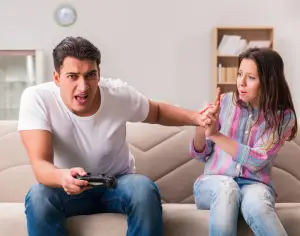The Pros And Cons Of Playing Video Games
Whether or not video game playing is healthy has been a topic of heated debate for decades. But what does the science really say? You can’t believe everything you read on the internet, and a lot of articles discussing this topic refer to vague “studies” and “research” without ever linking to where they found that information or even mentioning what institution published the results.
Some sources claim that video game play can improve hand-eye coordination and even eyesight, while others claim that that’s ridiculous because it actually decreases both. But who can you believe and how can you decide without resorting to the lens of your own biases?
In this article, you will find only facts supported by reliable sources with links to the original findings publications. It is not on anyone’s biases or guesses, but instead on the authority of those scientists and their peer-reviewed published study results that this pros and cons list rests.
How Gaming Impacts Decision-Making Skills 
Do video games improve them or have a negative effect decision-making skills?
A 2021 article published by Elsevier found that playing video games does, in fact, result in improved cognitive function and decision-making ability. The authors reviewed 27 experimental and literature review studies and compiled the information they found to reach this conclusion.
Furthermore, players of real-time strategy games were found to have more greatly improved cognitive functions than those who played only first-person shooter games.
This indicates that playing strategy games specifically can have an even greater positive effect on cognition, likely by forcing the nervous tissue to work more frequently under the healthy stress of strategic gameplay.
Conversely, however, the Journal of Sports Sciences published an article only one year before in which the authors concluded that “…the use of social networks on smartphones and/or playing video games right before official soccer matches might impair the passing decision-making performance in professional soccer athletes.”
This study was done on a set of 25 male soccer players around 23 years old. They were divided into three groups: the control group, the smartphone group, and the video game group. The participants’ focus was on their respective distractions right before a soccer game, and then their ability to focus was measured while performing on the field as well as through several other decision-making tests.
The participants who were distracted either with smartphones or video games right before playing performed slightly less effectively than those in the control group, which is what led the authors to conclude that playing video games right before a match could result in decreased decision-making performance.
Are these two sources at odds? Actually, no. The Elsevier article found that playing video games increases decision-making abilities over time. The Sports Sciences article found that the distraction of video game playing right before a game decreased decision-making abilities during the game.
Does this mean that in the long term, video games are useful for increasing cognitive function, while the short-term effect of the distraction might have a negative effect on cognition?
Based on these studies, that seems to be the case. This means that improved cognitive function is, in fact, a pro of video gaming, with the caveat that gamers should avoid gaming right before doing something else that will require their full attention.
Video Games And Stress Relief 
Do video games relieve stress or cause it?
A 2009 study published by the Journal of CyberTherapy and Rehabilitation found that “Electroencephalography (EEG) changes during gameplay were consistent with increased mood and corroborated findings on psychological reports. Moreover, heart rate variability (HRV) changes were consistent with autonomic nervous system relaxation or decreased physical stress.”
This means that when test subjects played casual video games, medical monitoring equipment found that their moods became more positive and that their heart rates slowed in a manner consistent with relaxation.
This is one study indicating that yes, stress can be relieved through playing casual video games. The keyword here being casual. As long as someone is playing just for fun and not taking it too seriously, it is great for stress relief. But what if the player is more seriously concerned with the competition?
While some games may be stress-relieving, others may actually be stress-inducing. A study published in 2017 by the American Psychological Association found through measuring stress parameters in vocalization that violent video games had a stressful effect on both male and female game players, while non-violent games did not.
So it seems that a blanket statement regarding all video games and their relationship with stress-relief or stress-induction cannot be made. Some video games promote relaxation while other cause stress.
So yes, some gaming can reduce stress, which makes this another pro of video gaming. However, spending an excessive amount of time playing stressful games will likely promote more of the video gaming cons addressed below.
How Gaming Impacts Hand-Eye Coordination
Do video games increase hand-eye coordination or reduce it?
A Journal of Undergraduate Kinesiology Research study involved 16 college football players between the ages of 18 and 23, half of whom played video games regularly and half of whom did not. Initial reaction times were collected and then all participants “played video games for a week.” No mention is made as to how long they played or what types of games they played.
The analysis afterward found that “…there was no significance in improved reaction time and hand-eye coordination with increased action video game playing.”
So can video games really affect hand-eye coordination in a positive way, if at all?
As medical technology advances, scientists are interested in whether virtual reality (VR) games can help individuals, particularly students of microsurgery, develop better hand-eye coordination and improve their ability to use robots for delicate surgeries. This same principle has also been studied in students of music.
The International Journal of Environmental Research and Public Health published a study in early 2021 in which 14 music students were instructed to play Beat Saber, a VR game, for 15 minutes every day for a week. The study found a statistically significant increase in hand-eye coordination of individuals who played the game over those who didn’t, even though the test took place over such a short period of time.
Maybe the difference in results is due to the first study’s participants being athletes while the second study’s consisted of musicians needing to improve finer, more delicate movements. Or maybe the football players didn’t play for an entire 15 minutes each day for a week (the study doesn’t specify). The difference could also be due to whether or not some participants already played video games regularly while others didn’t, which the musician study didn’t specify.
Gaming And Violent Tendencies
Does video gameplay have any effect on violent tendencies?
In a meta-analysis of 24 published studies involving 17,000+ individuals on the relationship between violent video gameplay and aggressive behavior, Dartmouth scientists found that “On the basis of this meta-analysis, we conclude that playing violent video games is associated with greater levels of overt physical aggression over time, after accounting for prior aggression. These findings support the general claim that violent video gameplay is associated with increases in physical aggression over time.”
This research was published by the Proceedings of the National Academy of Sciences of the USA.
However, in a study published by the Royal Society of Open Science involving 1004 teenagers 14-15 years old and their caregivers, scientists hypothesized that violent video gameplay would cause an increase in aggressive behavior relative to how much time was spent on the violent game.
But they found that “Results did not support this prediction, nor did they support the idea that the relationship between these factors follows a nonlinear parabolic function. There was no evidence for a critical tipping point relating violent game engagement to aggressive behavior.”
While these findings seem to be at odds as well, let’s take a closer look.
The first set of research data, which found that violent video gameplay does increase aggressive behavior, compiled information from studies that took place over as short a time span as 3 months and as long as 4 years. The study that found that there was no correlation took place over one single month.
From this information, we can conclude that violent video gameplay may not increase aggressive tendencies over the course of one month, but over a greater period of time, it will likely have a negative effect. This is an unfortunate con of violent video gaming, but not all video gaming in general.
Pros And Cons of Playing Video Games: Conclusion
So is gaming healthy or not? Just like most things in life, the amount of something that you take in is crucial to that answer. Candy isn’t healthy, but a little every now and then won’t hurt you and is enjoyable. The occasionality of it is even part of what makes it so enjoyable.
Video gameplay is similar. Playing games regularly for 12 hours a day will be much more likely to bring the cons out than playing for an hour or two here and there, and the occasional weekend extended playtime.
Additional topics of debate regarding the effects of video gameplay include physical activity, social isolation, addiction, and struggles with financial control. While these additional topics are beyond the scope of this article, they are very relevant issues.
Because so many studies have been published on these and related topics, often appearing to come to different conclusions, I encourage you to do some research of your own. To find scientific articles that can be trusted as legitimate sources, google “scholarly articles on video games and addiction” or whatever aspect you are specifically interested in learning about.
Read through the abstracts of the studies for a general idea and then look closer to see what the differences are between how the studies were done to find out why different articles seem to come to different conclusions. Then, armed with the whole story, you’ll be able to make your own informed decision.
For your health, consider how much gaming you’re taking in and whether the enjoyment of it outweighs the negative effects. Odds are, the longer you play, the less you’ll enjoy the time and the more addicted you could become. Avoiding that outcome would be ideal.
If you can instead mix in some other activities with your gameplay, you may find yourself both enjoying the game time more and seeing less of the negative side effects of excessive gaming at the same time.
You can check out my other recent gaming articles here.

